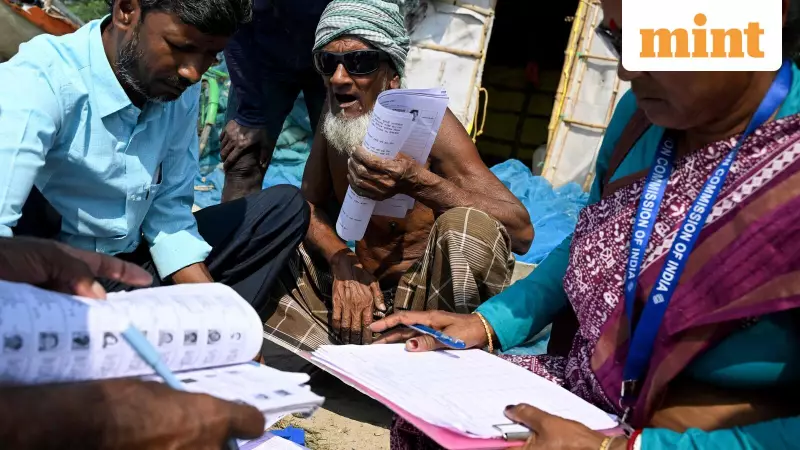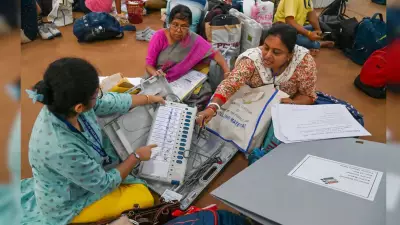
Supreme Court Directs Election Commission on Electoral Roll Revision
The Supreme Court of India has taken significant action regarding the ongoing Special Intensive Revision (SIR) of electoral rolls in Tamil Nadu and West Bengal. On Tuesday, the apex court requested separate responses from the Election Commission concerning petitions filed by several political parties challenging the revision process.
Court Proceedings and Key Directives
A bench comprising Justices Surya Kant and Joymalya Bagchi directed the Election Commission to file its replies within two weeks. The court also instructed the Madras and Calcutta High Courts to suspend any ongoing proceedings related to challenges against the SIR exercise in both states. Additionally, the bench permitted the AIADMK to intervene in support of the SIR process in Tamil Nadu.
The political parties involved in the petitions include the DMK, CPI(M), West Bengal Congress, and Trinamool Congress leaders. These parties have raised serious concerns about the methodology and timing of the electoral roll revision.
Petitioners' Arguments Against SIR
During the hearing, senior advocate Kapil Sibal, representing the ruling DMK in Tamil Nadu, presented multiple arguments against the current SIR implementation. He contended that the exercise is being conducted hastily without following proper due process. Sibal highlighted that different sets of documents are being demanded from voters, creating confusion and inconvenience.
Weather conditions pose another significant challenge, according to Sibal. He noted that the northeast monsoon in Tamil Nadu typically brings heavy rainfall during November and December, with meteorological departments predicting heavier than usual rains this year. This weather pattern would not only affect citizens preparing for potential flooding but also burden revenue officials who serve as Booth Level Officers (BLOs), Electoral Registration Officers (EROs), and Assistant Electoral Registration Officers (AEROs) with flood relief responsibilities alongside electoral duties.
Sibal also raised concerns about technological infrastructure, pointing out that poor connectivity in certain areas of Tamil Nadu and West Bengal would create difficulties in uploading necessary documents. He emphasized that rural connectivity in West Bengal is particularly problematic.
Court's Perspective and EC's Position
Justice Kant acknowledged that in a country as vast as India, some states will inevitably face natural calamities during electoral processes. The bench observed that the case appeared to present the electoral roll preparation as unprecedented, though the constitutional authority has conducted such exercises before.
The court reassured political parties that they should not be apprehensive about the exercise, noting that the Election Commission would provide all necessary details. Justice Kant stated clearly that if the court finds anything wrong with the process, it would annul the entire exercise.
When petitioners argued that different modalities were being adopted in Tamil Nadu compared to the Bihar SIR exercise, the bench suggested this might indicate that the EC had rectified previous mistakes. The court advised the Election Commission to adopt the best practices from the Bihar SIR while always considering local conditions.
Senior advocate Rakesh Dwivedi, representing the Election Commission, sought permission to file replies to the fresh petitions. The court has scheduled further hearings for November 26 and 27, when it will address arguments regarding interim relief, including potential stays on the SIR process.
Constitutional Challenges and Political Positions
The petitions filed challenge the SIR in Tamil Nadu, West Bengal, and Puducherry on various grounds. DMK's R S Bharathi, through advocate Vivek Singh, has claimed the exercise violates Articles 14, 19, and 21 of the Constitution, along with provisions of the Representation of the People Act and the Registration of Electors Rules of 1960.
The CPI(M) has challenged the constitutional validity of the EC's directive, terming the SIR process arbitrary, illegal, and unconstitutional. In contrast, the AIADMK has supported the poll panel's decision, describing it as a legitimate and necessary exercise to maintain election integrity and prevent voter fraud.
Background on SIR Implementation
The Election Commission announced the second phase of the Special Intensive Revision on October 27, covering 12 states and Union Territories. The revision process, scheduled between November and February next year, includes Andaman and Nicobar Islands, Lakshadweep, Chhattisgarh, Goa, Gujarat, Kerala, Madhya Pradesh, Puducherry, Rajasthan, Tamil Nadu, Uttar Pradesh, and West Bengal.
Notably, Tamil Nadu, Puducherry, Kerala, and West Bengal are scheduled to hold assembly elections in 2026. The EC has clarified that for Assam, where polls are similarly due in 2026, the electoral roll revision schedule will be announced separately.
The current phase of SIR began on November 4 and will continue until December 4. The draft electoral rolls will be published on December 9, with final rolls scheduled for release on February 7.





